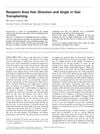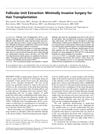 July 2023 in “International Journal of Cosmetic Science”
July 2023 in “International Journal of Cosmetic Science” Biopolymers are increasingly used in cosmetics for their non-toxicity and skin benefits, with future biotech advancements likely to expand their applications.
 17 citations,
January 2013 in “Our Dermatology Online”
17 citations,
January 2013 in “Our Dermatology Online” Dutasteride mesotherapy helps treat male hair loss but may harm sperm and sexual function.
 11 citations,
October 2021 in “Frontiers in Cell and Developmental Biology”
11 citations,
October 2021 in “Frontiers in Cell and Developmental Biology” Non-coding RNAs are important for hair growth and could lead to new hair loss treatments, but more research is needed.
2 citations,
October 2021 in “Experimental Cell Research” Injectable platelet-rich fibrin helps hair growth by boosting key cell functions.
 7 citations,
March 2022 in “Frontiers in Genetics”
7 citations,
March 2022 in “Frontiers in Genetics” The research found specific genes that may cause longer hair in Tianzhu White Yak.
1 citations,
May 2022 in “International Journal of Cosmetic Science” Edelweiss extract can increase hair density and promote hair growth.
 65 citations,
August 2007 in “Experimental Dermatology”
65 citations,
August 2007 in “Experimental Dermatology” Human hair follicles can make and process prostaglandins, which may affect hair growth.
 24 citations,
April 2005 in “The Journal of Dermatology”
24 citations,
April 2005 in “The Journal of Dermatology” Putting ketoconazole on the skin can help mice grow hair.
FGF5 spliceosomes inhibit rabbit hair growth by affecting gene expression.
 12 citations,
March 2019 in “Lasers in Surgery and Medicine”
12 citations,
March 2019 in “Lasers in Surgery and Medicine” Low-level laser therapy improves hair growth and dermal papilla cell function.
 1 citations,
March 2023 in “Phytochemistry Reviews”
1 citations,
March 2023 in “Phytochemistry Reviews” CBD may improve skin and hair health, but its effective use and safety need more research.
 January 2018 in “Stem cell biology and regenerative medicine”
January 2018 in “Stem cell biology and regenerative medicine” The nucleus is key in controlling skin growth and repair by coordinating signals, gene regulators, and epigenetic changes.
 41 citations,
September 2017 in “Advanced Healthcare Materials”
41 citations,
September 2017 in “Advanced Healthcare Materials” A special hydrogel helps heal skin without scars and regrows hair.

Nanocarriers with plant extracts show promise for safe and effective hair growth treatment.
 November 2023 in “International Research Journal of Modernization in Engineering Technology and Science”
November 2023 in “International Research Journal of Modernization in Engineering Technology and Science” Herbal shampoos clean and improve hair naturally without harmful side effects.
 112 citations,
July 1998 in “Journal of Investigative Dermatology”
112 citations,
July 1998 in “Journal of Investigative Dermatology” Ruby laser pulses best destroy hair follicles during the growth phase and effectiveness varies with laser intensity; melanin is key for targeting, and timing treatments can improve results.
 October 2024 in “Journal of Advanced Pharmaceutical Technology amp Research”
October 2024 in “Journal of Advanced Pharmaceutical Technology amp Research” Trigonelline nanocrystal cream effectively promotes hair growth and may reduce side effects.
 August 2023 in “Journal of analytical & pharmaceutical research”
August 2023 in “Journal of analytical & pharmaceutical research” Microneedle-assisted therapy with human basic fibroblast growth factor significantly regrew hair in patients with hair loss.
 3 citations,
May 2019 in “Journal of Cosmetic Dermatology”
3 citations,
May 2019 in “Journal of Cosmetic Dermatology” Miliacin with polar lipids helps hair growth and improves hair loss in women.
 23 citations,
April 2006 in “Skin Research and Technology”
23 citations,
April 2006 in “Skin Research and Technology” The study concluded that a special imaging technique showed women with hair loss have slower hair growth and a faulty hair replacement cycle.
 September 2023 in “Journal of Nutrition and Metabolism”
September 2023 in “Journal of Nutrition and Metabolism” One Ashwagandha extract may help protect cells with its antioxidant properties, while another could promote hair growth.
January 2024 in “Cosmetics” Menopause worsens skin, hair, and nails, affecting self-esteem and quality of life.
 23 citations,
February 2015 in “International Journal of Molecular Sciences”
23 citations,
February 2015 in “International Journal of Molecular Sciences” Colchicine can inhibit hair growth by affecting cell activity and protein expression in hair follicles.
 5 citations,
January 2015 in “Current problems in dermatology”
5 citations,
January 2015 in “Current problems in dermatology” The document provides a practical guide for diagnosing and treating various types of hair loss.
May 2024 in “Molecules/Molecules online/Molecules annual” Plant extracts can help prevent hair loss and promote hair growth.
 June 2004 in “Dermatologic Surgery”
June 2004 in “Dermatologic Surgery” Dr. Walter P. Unger suggests that copying a person's natural hair direction and angle during transplants leads to a more natural and fuller appearance.
 153 citations,
August 2002 in “Dermatologic Surgery”
153 citations,
August 2002 in “Dermatologic Surgery” Follicular Unit Extraction (FUE) is a less invasive hair transplant method with minimal scarring, suitable for about 60% of patients, especially those needing fewer grafts and quicker recovery.
45 citations,
June 2003 in “Journal of Investigative Dermatology Symposium Proceedings” Understanding hair follicles through various models can help develop new treatments for hair disorders.
 33 citations,
August 2018 in “Facial Plastic Surgery Clinics of North America”
33 citations,
August 2018 in “Facial Plastic Surgery Clinics of North America” The document explains hair biology, the causes of hair loss, and reviews various hair loss treatments.
 3 citations,
June 2006 in “Expert Review of Dermatology”
3 citations,
June 2006 in “Expert Review of Dermatology” The document concludes that hair loss is complex, affects many people, has limited treatments, and requires more research on its causes and psychological impact.
























